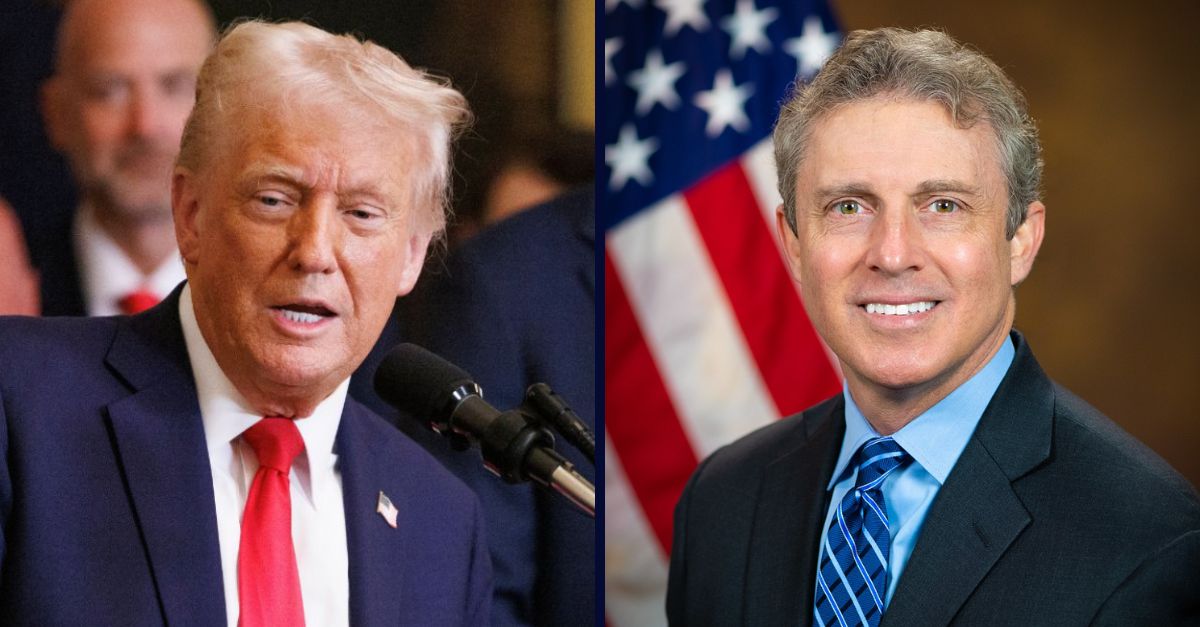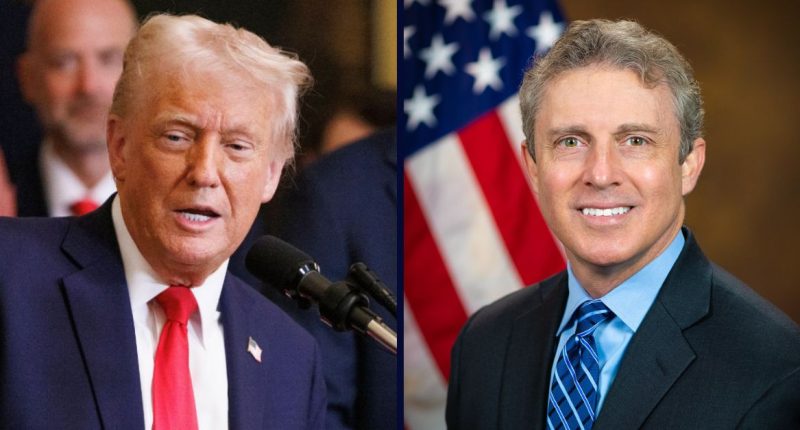
Left: President Donald Trump gives remarks during an event celebrating the 2024 Stanley Cup Champion the Florida Panthers in the East Room of the White House in Washington, DC on Monday, February 3, 2025 (Photo by Aaron Schwartz/Sipa USA)(Sipa via AP Images). Right: Hampton Dellinger (Office of Special Counsel).
President Donald Trump unlawfully booted Biden ethics enforcer Hampton Dellinger from the Office of Special Counsel after he took office in January, a federal judge ruled Saturday — setting the stage for a critical Supreme Court battle — with Trump’s Justice Department condemning the weekend judgement as an “extraordinary intrusion into the president’s authority.”
“In sum, it would be antithetical to the very existence of this particular government agency and position to vindicate the President’s Article II power as it was described in Humphrey’s Executor (Humphrey’s Executor v. United States): a constitutional license to bully officials in the executive branch into doing his will,” wrote U.S. District Judge Amy Berman Jackson in a 67-page opinion.
Jackson, a Barack Obama appointee, ruled in favor of letting Dellinger keep his job after listening to arguments from DOJ lawyers and Delligner’s legal team at multiple hearings over the past month, which stemmed from a temporary restraining order she issued on Feb. 12 that stayed Trump’s original termination of Dellinger in January.
Dellinger, who was appointed by Joe Biden in 2024 to lead the Office of Special Counsel and enforce whistleblower laws, filed a lawsuit on Feb. 10 in the District of Columbia after being axed “in a one-sentence email,” according to his federal complaint.
The DOJ tried arguing that Dellinger was removed because he’s “wielding executive power” and has rule-making authority that gives him the ability to punish the Trump administration and people in the executive branch at-will. Jackson, instead, called it “rule-reading authority” at previous hearings — ultimately agreeing with arguments from Dellinger’s lawyers, who said he could only conduct probes and make suggestions — and she stuck with that assessment in her ruling Saturday.
“The Office of Special Counsel is not assigned responsibilities that include furthering the administration’s agenda,” Jackson said. “It is the Special Counsel’s job to look into and shine light on a set of specific prohibited practices so that the other bodies, in the appropriate exercise of their constitutional authority, can take whatever action they deem to be appropriate. To do this as Congress intended that he should, he must remain entirely free of partisan or political influence, and that is why the statute survives scrutiny even under the most recent precedent.”
More from Law&Crime: ‘Maximally transparent’ DOGE now tells federal court its records are ‘not subject to FOIA’ requests
According to Jackson, a review of the “statutory provisions” setting out the powers and functions of the Office of Special Counsel and the “history of the legislation” establishing its position and terms “reveals that his independence is inextricably intertwined with the performance of his duties,” per her ruling.
“The Special Counsel’s job is to look into and expose unethical or unlawful practices directed at federal civil servants, and to help ensure that whistleblowers who disclose fraud, waste, and abuse on the part of government agencies can do so without suffering reprisals,” Jackson explained. “It would be ironic, to say the least, and inimical to the ends furthered by the statute if the Special Counsel himself could be chilled in his work by fear of arbitrary or partisan removal.”
Trump’s DOJ lawyers announced in court filings Saturday that they were taking Jackson’s ruling up with the D.C. Court of Appeals. They motioned to stay the judge’s order declaring Trump’s firing of Dellinger as “unlawful” — once again saying that he should remain terminated, pending the appeal — after multiple failed attempts to get Jackson’s TRO tossed last month, including an unsuccessful bid in appeals court.
Trump’s DOJ insists that the president’s Article II power gives him the ability to get rid of Dellinger because it “precludes Congress from placing limits on the President’s authority to remove principal officers of the United States who serve as sole heads of an Executive Branch agency.” In its motion to stay Jackson’s order, DOJ lawyers said her relief “constitutes an extraordinary intrusion into the president’s authority.” They stated that they believe the DOJ is “likely to succeed on the merits” of its claims if the Dellinger case is heard by the Supreme Court, as pushed by Trump.
More from Law&Crime: ‘Put simply, this makes no sense’: Fani Willis rips appeals court over disqualification from Trump case, seeks reversal from state supreme court
His administration issued an urgent plea to the country’s highest court last week, asking it to quickly take up and start weighing the grounds for vacating the lower court’s original order, after Dellinger was granted an extension Wednesday by Jackson. DOJ lawyers claimed Dellinger barred the president from firing federal employees last month that his administration says are unfit to work for the government, according to a letter sent by the DOJ to the Supreme Court. Dellinger and his lawyers sent out a letter of their own Thursday in response, claiming Trump’s legal team misinterpreted what happened with the firings.
“It was the [Merit Systems Protection Board], not the Special Counsel, that ‘halt[ed]’ certain personnel actions and it is the MSPB (not the Special Counsel) that will render any further decisions and issue any binding orders within the Executive Branch’s internal administrative process concerning the propriety of those personnel actions,” Delliger’s attorney Joshua Matz said. “As the Special Counsel is fully prepared to explain when the government properly raises this issue within the litigation, there is no merit to the government’s assertion that this administrative action supports its position. To the contrary, a more accurate understanding of that process confirms the Special Counsel’s position concerning his for-cause removal protection.”
Dellinger allegedly launched an OSC probe into the terminations of six federal workers by Trump just days after a temporary restraining order was granted by Jackson to reinstate him as special counsel after the president fired him on Feb. 10. Dellinger conducted the investigation and then filed a petition with the Merit Systems Protection Board last Friday to reverse the firings. He was given his first TRO lifeline by Jackson on Feb. 12; his office reportedly announced the OSC probe on Feb. 14.
“The Supreme Court has made clear — twice, and recently — that Article II precludes Congress from placing limits on the President’s authority to remove principal officers of the United States who serve as sole heads of an Executive Branch agency,” the DOJ motion said Saturday. “On that basis, President Biden in 2021 fired the single head of the Social Security Administration without cause. In removing Plaintiff as the head of OSC, another Executive Branch agency with a single head, the President merely exercised the same authority that President Biden did in removing the Social Security Commissioner and that the Supreme Court recognized as lawful in Seila Law and Collins.”
Love true crime? Sign up for our newsletter, The Law&Crime Docket, to get the latest real-life crime stories delivered right to your inbox.








